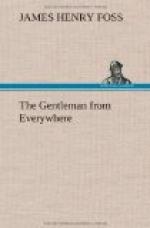Then he took the “kids” one by one, and set them up with their backs to the side of the shanty, and we, not daring to beard the lion in his den by declining, obeyed. The next morning we found ourselves set up alongside the children on the floor, while the old man and his wife were snoring on the bed. Verily, “For ways that are dark and tricks that are vain, the heathen ‘Cracker’ is peculiar.”
CHAPTER XXXII.
LOOKING FORWARD.
When I was writing the last words of the preceding chapter of this book, and was about to
“Heed my tired pen’s entreaty,
And say, oh, friends, valete,”
I seemed to be trying to awake from a trance in which I had been the unwilling instrument, compelled by an intelligence extraneous to myself to expose to an incredulous public the most sacred scenes and thoughts of a lifetime.
I had decided to relieve the patience of my readers with the thirty-first chapter; but when the retrospective kaleidoscope closed, a vision rose before me so vivid, so real, that I am constrained to describe it in the hope that the warning may prevent the tragic part of the dream from becoming a reality.
It is Christmas day in the year of our Lord, 1910; the thunder-cloud, which for many years had been increasing in blackness, now surcharged with pent-up lightnings, and overspreading our entire national horizon, bursts with the fury of a cyclone.
The great masses of the people had for a long time watched with ever-increasing rage the seeming conspiracy of the employing and professional classes to bind to their chariot-wheels those who labored with their hands. Gigantic trusts had “cornered” all the necessaries of life, and a few lily-fingered plutocrats in their marble palaces dictated to the horny-handed sons of toil the amount of their beggarly wages, and the prices they must pay for every needed article, until every job of work and every bone of charity was fought for by multitudes who mercilessly stabbed each other in their mad fury to assuage the pangs of hunger.
When the people rallied at the polls, and elected to the high offices members of their own unions, the millionaires bribed these officials to obey their every command, and these mercenary law-makers, as often as chosen, joined the ever-growing ranks of the oppressors.
Even the almost innumerable colleges throughout the Republic, whose treasuries had absorbed countless millions of dollars, had proved a measureless curse, as they had become mere cramming machines and nurseries of lawlessness and brutality. The great universities had long idolized plug-ugly football kickers and baseball sluggers to the utter ignoring of scholarship, until the hordes of eleemosinary prize-fighters among the so-called students created a reign of terror where they were located, and far surpassed in ferocity even the gladiators of ancient Rome. The annual “athletic contest” between the two greatest universities was fought out with almost inconceivable fury on “Soldiers’ Field.”




